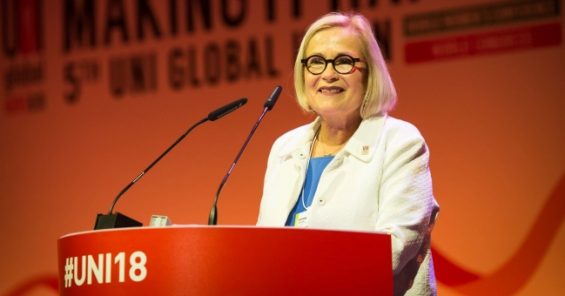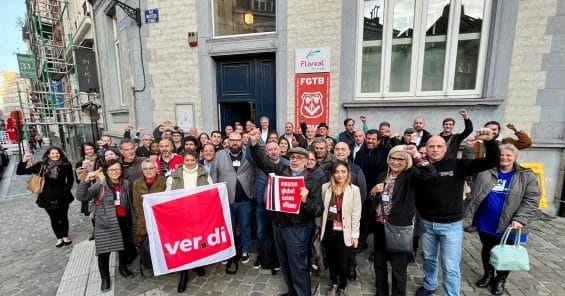Christy Hoffman was elected the new General Secretary of UNI Global Union during the labour federation’s Fifth World Congress in Liverpool in June 2018.
Her election was unanimously backed by UNI’s affiliates and widely supported by the global labour movement.
Sharan Burrow, the General Secretary of the ITUC said, “The ITUC congratulates UNI for electing Christy as your new General Secretary. Christy has organising in her veins. A great strategist and a fighter to the core, she makes it happen.”
Hoffman is prepared to tackle the most pressing issues workers face today. She is committed to growing UNI’s Breaking Through agenda and taking on the systemic problems driven by an economic model which works for the few, not the many.
“We must address our biggest challenges as a united front. No solitary worker, no single union, and no individual country can turn the tide in a world with multinational corporations setting the rules of the game.” she said.
From local to global, winning for workers
Hoffman’s lifetime commitment to the labour movement began in Connecticut on the shop floor of a jet engine factory, where in 1978, she began her long track record of winning for workers and was elected chief steward of the 2,000-person facility while still in her twenties.
During those early years, she held several positions in her District of 20,000 workers: health and safety representative, negotiator, strike leader. She went on to join her union’s staff as an organiser of industrial workers, winning campaigns against the odds. She was later appointed as a national representative of the International Association of Machinists. At the time, she was the only woman in the country to hold that position.
In 1997, as an attorney for the International Brotherhood of the Teamsters, she helped spearhead a national bargaining campaign to create full-time jobs from part-time work at UPS—something that seemed impossible at the time. Hoffman’s team developed a coordinated national strategy, and when bargaining broke down, she played a central role in the historic national strike of over 200,000 workers in the United States, which led to an agreement with the company creating 10,000 new full-time jobs.
Hoffman is an accomplished litigator who can claim many victories for workers and unions. Hoffman’s work as a union attorney also included serving as counsel during a seven-month national miners’ strike in 1993 and reaching an organizing agreement between SEIU and one of the largest health-care employers in the United States.
In 2004, she began her first position at UNI as Head of Property Services and negotiated global agreements with the sector’s largest employers: ISS, G4S, and Securitas.
After returning to SEIU to lead their international organising department and federal initiatives program, Hoffman came back to UNI to assume the role of Deputy General Secretary in 2010. In this capacity, she has focused on strengthening workers’ power within multinational corporations; growing unions globally; and improving legal and institutional frameworks, such as OECD Guidelines.
“At an early age, I learned about the power that unions have to address inequality—economic inequality, gender inequality, and racial and ethnic inequality—in my workplace,” she said. “Now, I know that unions are a solution to the ravages of inequality not just at our jobs, but in our communities, countries, and around the world.”
Holding multinationals accountable
As Deputy General Secretary, Hoffman frequently drove negotiations for UNI’s global agreements, and in her new position, expanding and improving these agreements which ensure workers can freely win union representation will be a key focus.
“Too often the richest, most powerful companies in the world have business models built on the lowest pay and conditions they can get away with. That often means using intimidation, manipulation, and other scare tactics to weaken and break unions. But when workers unite—and they are supported by unions who protect their rights —they win, and these victories reverberate throughout the world.”
Hoffman was also an architect of the ground-breaking Bangladesh Accord for Building and Fire Safety. In 2013—weeks after 1,137 Bangladeshi’s lost their lives in the worst industrial catastrophe in modern times—Hoffman, along with leaders at IndustriALL and several NGOs, developed the first legally-binding agreement for supply-chain justice.
Five years later, more than 2 million workers are in factories covered by the Accord and tens-of-thousands of serious safety hazards have been abated. When brand signatories failed to comply with the Accord, Hoffman lead the effort to bring cases to arbitration and then negotiated settlements totalling nearly $3 million. A second Accord went into effect in June 2018.
The Accord is widely seen as an innovative model that should be replicated in other industries and countries.
“Bigger and bolder” for stronger unions
In addition to global agreements and the Accord, Hoffman has worked closely with UNI SCORE, and as General Secretary, she will prioritise the strategic campaigning centre’s programs to support union growth.
“While sectors, regions, and countries have their differences, we share a common desire to win for workers. Building on this foundation, UNI enables our affiliates to share best practices and learn from one another.” she said. “These exchanges will continue along with our more direct support for organising in specific campaigns. Our organising centres, currently in Central Europe and Colombia, reflect our recognition that we can’t build capacity on a ‘one-campaign-at-a-time basis’—we need to think bigger and bolder and look for sector wide solutions.”
For example, UNI is working with Central European unions to defend and expand sectoral bargaining.
Improving international rules to advance workers’ rights
“Disregard for fundamental rights is all too common and growing across the globe. In addition to sharpening the tools we have, we must develop new tools and advocate for stronger, legally-binding mechanisms, such as a UN Binding Treaty on Business and Human Rights. New rules for our supply chain, the requirement for due diligence and responsible investment policies should all be part of the package.”
Hoffman succeeds UNI’s previous General Secretary Philip Jennings, who led the organisation for 18 years.
“Under Christy’s leadership the organization that we’ve built over the last 18 years will go from strength to strength and continue on the path to breaking through and organizing,” he said.


